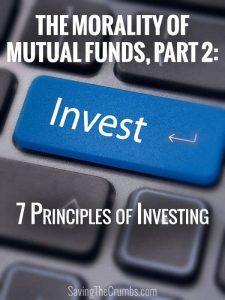In our
previous post, we evaluated the question of whether by investing in mutual funds, we would be complicit in and culpable for the immoral activities of businesses held within the funds.
From Scripture, the principle we discovered was that God does not hold us responsible for the evil that may occur through our
indirect associations when we go about accomplishing the good that we should be doing—in fact, that’s a standard that God Himself cannot meet since He’s the one who sends the sunshine and rain upon both the good and evildoer. Paul adds that the only way for us to reach that level of moral purity would be for us to leave the world entirely—something we certainly hope to do someday, but not an option currently.
Getting Ahead of Ourselves
Not long ago, after listening to an acquaintance explain how he simply doesn’t feel right investing in mutual funds for this reason, he immediately tried to sell me animatedly on the latest cryptocurrency (because Bitcoin is so passé) that he predicted would go “boom” in the next few months. He projected being set for retirement after that. Others have tried to assuage their conscience by trying to convince me that trading currencies was the morally superior way to mutual funds, and yet others thought trading individual stocks or options was the answer.
I have found it strange how these apparently well-meaning and conscientious individuals would strain at the gnat of mutual funds due to their “contamination” by incidental contact with immoral businesses, while swallowing the camel of ignoring other very basic and common sense principles when it comes to investing. Somehow, they’ve made the rule of morally pure indirect associations of such magnitude that it outweighs any and all other considerations.
Let’s not get ahead of ourselves, because there are more principles than one to consider when thinking about investing. Let’s take a look at some of them now in our evaluation of appropriate investments for the Christian.
#1-Never Invest in Something You Don’t Understand
This should go without saying, but it’s so easy to get caught up with the excitement of striking it rich that common sense goes out the window. The Bible counsels that knowledge is key to building wealth:
Through wisdom is an house builded; and by understanding it is established: And by knowledge shall the chambers be filled with all precious and pleasant riches. – Proverbs 24:3-4 KJV
Some key questions to know clearly about any investment are the following:
- How does it make money? Is this thing actually making money in a legit way? Or is it just a Ponzi scheme? Does it just require another dumber sucker to come along after me?
- How can it lose money? There’s no such thing as a risk-free investment, so if the sales pitch you’re hearing is that it can’t lose money, then run away as fast as you can. It’s no fun to talk about risk, but you owe it to yourself to understand what the risks are before you jump in. And usually, this is the type of information that no one is eager to tell you.
- What are the costs? What are the upfront fees? Transaction fees? Ongoing management fees? Special administrative/marketing fees? Broker commissions? Tax ramifications? Many investment experts say that controlling your cost is one of the most effective ways of maximizing future returns.
- What are the rules? We’re not just talking about whether something is legal or illegal. That should go without saying, but some investments have special requirements for you to join (you may need to be an “accredited investor”). It’s also important to know if there are regulations that protect you as an investor as well.
#2-Don’t Speculate
This is such an important topic, I’ve already written an entire post about it called
Of Speculating, Investing, and Tulips. Refer to that for more information on the sad history we humans have had with the sport of speculating.
In summary, speculating is betting on the arbitrary price movements of an asset divorced from the productivity and value of the underlying asset. More often than not, the speculator is motivated to get rich quick, and that’s something that’s not promoted in Scripture.
A faithful man will abound with blessings, but whoever hastens to be rich will not go unpunished. – Proverbs 28:20 ESV
Do not weary yourself to gain wealth, cease from your consideration of it. When you set your eyes on it, it is gone. For wealth certainly makes itself wings like an eagle that flies toward the heavens. – Proverbs 23:4-5 NASB
Rest in the Lord and wait patiently for Him; do not fret because of him who prospers in his way, because of the man who carries out wicked schemes. – Psalm 37:7 NASB
And might I add that speculators who lack the essential knowledge are the ones who get into the most serious kinds of trouble. They see or hear of others making overnight riches, and they’re willing to throw caution to the wind to jump on the speculation bandwago
n. If you can’t conquer #1 on this list, please don’t fall for #2!
#3-Diversify
The wisest man who ever lived (apart from Jesus) was also a very wealthy man. Here’s what Solomon had to say:
Give a portion to seven, or even to eight, for you know not what disaster may happen on earth. – Ecclesiastes 11:2 ESV
In simple terms, the principle is to not put all of your eggs in one basket. If all your wealth is bound up in your house, it just takes one tornado or flood or earthquake to wipe out all of your net worth. The same is true if you invest all your money in just one or two businesses. Diversification is one of the most bedrock investing principles, and it’s a Biblical one at that.
#4-Beat Inflation Over the Long Run
In the parable of the talents (Matthew 25:14-26), the servant who buried his talent in the ground was severely punished. Why was he punished? It wasn’t because he LOST the Master’s money. It was because he didn’t INCREASE the Master’s money. The Master expected a return on His investment, not just a preservation of His capital!
In application today, any investment that merely matches the rate of inflation over the long run is the equivalent to burying the talent in the ground. It’s not gaining anything. So any investment that LAGS inflation is positively LOSING money in the long-term. That’s WORSE than burying the talent in the ground!
As an interesting side note, the parable states that both of the first two servants doubled their initial capital, which was a 100% total return. We don’t know how many years they were investing, but we’re told that the Master came back after “a long time” to settle their accounts. So just for illustration, let’s imagine that it was either 10, 15, or 20 years. What annualized rate of return would those servants have had to achieve in order to double their money after adjusting for inflation? (We’ll assume 3% average annual inflation.)
| Years |
Annualized Rate of Return |
| 10 Years |
Approx. 10% |
| 15 Years |
Approx. 8% |
| 20 Years |
Approx. 6.5% |
As you can see, these numbers aren’t outrageously out of the realm of possibility (especially the farther out you go). So while beating inflation is essential, having an insanely high rate of return isn’t required either.
#5-Know Your Risk Tolerance
As discussed in a previous post on
Investing: The Game of Risk, there’s no such thing as a risk-free investment. All we can do is pick our risk intelligently and manage it prudently. A few factors that contribute to our personal risk tolerance are the following:
- Investment Time Horizon. Another way to put it is when you will need the money. Typically, the farther off the need, the higher risk can be accepted because there’s more time to recover should something bad happen. So in general, younger people can take on greater investment risk than older people since they have more time on their hands. (Or as I like to call it, the Secret Ingredient of Investing)
- Knowledge. The more an individual understands about investing, the more risk they can take on because they’ve moderated the risk through their own personal education. Remember point #1.
- Other Assets/Income Streams. How much are you reliant on the investment? Are there other pension or Social Security checks that might be able help spread out the need? Are there special skills or is there the ability to work a bit more to diffuse the risk?
- Personal Risk Appetite/Aversion. Just like people have differing comfort levels with sky-diving, personality has a lot to do with investment risk too. How comfortable would you be if you saw your investment portfolio cut in half overnight? Would you be able to sleep? Some people can sleep like a baby while others would have a nervous breakdown. Know what your personal appetite or aversion to risk is before selecting your investment choices—you wouldn’t want to be wracked with chronic insomnia over it!
While risk is unavoidable in life, we should be wise in managing it so to not risk more than we can afford to lose. The Bible tells of the result when we don’t manage our risk properly:
When those riches were lost through a bad investment and he had fathered a son, then there was nothing to support him. – Ecclesiastes 5:14 NASB
#6-Maintain Balance With Other Priorities in Life
Few of us have the time to become investment experts. Even fewer of us care to become professional real estate developers, options trading gurus, or forex ninjas. We need to remember that investing is primarily to help us make provision for our family’s future needs. Rather than being another ball and chain that ties us down to our money, it should give us greater freedom. Our money should be working for us, instead of us working more for our money! So it is important to maintain proper perspective and life balance in our investment choices so they don’t sap precious time away from other important priorities in life–things like family, healthy living, ministry in our church and community.
Here are some general Biblical counsels on managing our time and life priorities:
Conduct yourselves wisely toward outsiders, making the best use of the time. – Colossians 4:5 ESV
But seek ye first the kingdom of God, and his righteousness; and all these things shall be added unto you. – Matthew 6:33 KJV
While we look not at the things which are seen, but at the things which are not seen: for the things which are seen are temporal; but the things which are not seen are eternal. – 2 Corinthians 4:18 KJV
Lay not up for yourselves treasures upon earth, where moth and rust doth corrupt, and where thieves break through and steal: But lay up for yourselves treasures in heaven, where neither moth nor rust doth corrupt, and where thieves do not break through nor steal: For where your treasure is, there will your heart be also. – Matthew 6:19-21 KJV
#7-Liquidity
In reading through the Bible, there are occasions when the Lord asked individuals to sell everything for His sake. The rich young ruler comes to mind as one of the classic examples (Luke 18:19-24), but Jesus asked that of all His disciples too (Mark 10:28) along with many other faithful men and women throughout Scripture. I believe the Lord will ask many of His people to do likewise as we near the end of time, but at any time in history, it’s always God’s prerogative to ask His people to leave everything behind. (Think of all the self-sacrificing missionaries throughout the years, for example.) If I really believe that my true treasure is in heaven, the evidence that my heart is there would be if I am willing to part with all the stuff down here (Matthew 6:19-21). So to have my affections set on things above, and not on things on this earth (Colossians 3:2), I believe I should have my financial affairs arranged with a thought-out exit plan in the event that God asks that of me.
Practically, this means that it’s important to have a liquidation plan for our assets. That’s not to say that all of our assets must be liquid, although it certainly would be easier, but simply that we need to understand the process and time required to liquidate and exit our investments should the need arise. Also, it means to keep a careful eye on our investment portfolio as a whole to not have an undue amount of illiquid assets that are hard to get out of.
An Investment Filter
So based on these principles, I’ve come up with an investment filter that helps me gauge the desirability of an investment. Here it is:
- Do I understand how it works?
- Is it speculative?
- Is it low cost?
- How much time does it take to manage?
- Is it an acceptable amount of risk?
- Is it diversified or easy to diversify?
- Does it beat inflation over the long-term?
- How liquid is it?
And additionally, in the vein of the discussion that we’re having in this series of posts, a 9th filter can be the “Indirect association with immorality” filter. But notice, “Incredibly high rate of return” is NOT one of the filters!
In our next post, we’ll get practical and apply this filter to some common investment options to see how they stack up. The ideal investment will clear all of these filters, but as you will see, such an investment doesn’t exist. But what options are there that come the closest? Join us in the next post to find out!
Did I miss anything? Are there other investment principles that we ought to take into account when selecting our investments?
Check out the other parts of this series:






